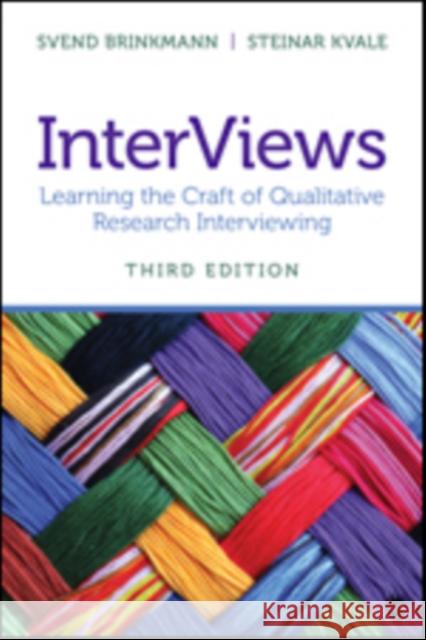InterViews: Learning the Craft of Qualitative Research Interviewing » książka



InterViews: Learning the Craft of Qualitative Research Interviewing
ISBN-13: 9781452275727 / Angielski / Miękka / 2014 / 424 str.
InterViews: Learning the Craft of Qualitative Research Interviewing
ISBN-13: 9781452275727 / Angielski / Miękka / 2014 / 424 str.
(netto: 252,78 VAT: 5%)
Najniższa cena z 30 dni: 264,39
ok. 10-14 dni roboczych.
Darmowa dostawa!
This book invites the reader on a journey through the landscape of interview research, by outlining paths that learners may follow on the way to their research goals, and providing conceptual aids and toolboxes that facilitate learning the craft of interviewing.
Glosariusz/słownik
Wydanie ilustrowane
"I greatly value [this book] because [it] articulates the philosophical and methodological approach to validity in qualitative interview research like no other text . . . We consider it our qualitative interview method bible." Jean Richey, University of Alaska Fairbanks
List of Boxes, Figures, and Tables
Preface to the Third Edition
Acknowledgments
About the Author
Introduction
1. Introduction to Interview Research
Conversation as Research
Three Interview Sequences
Interview Research in History and in the Social Sciences
The Interview Society
Methodological and Ethical Issues in Research Interviewing
Overview of the Book
Interviewing as a Craft
Interviewing as a Social Production of Knowledge
Interviewing as a Social Practice
Part I: Conceptualizing the Research Interview
Part II: Seven Stages of Research Interviewing
Concluding Perspectives
PART I. Conceptualizing the Research Interview
2. Characterizing Qualitative Research Interviews
A Qualitative Research Interview on Learning
Phenomenology and the Mode of Understanding in a Qualitative Research Interview
Power Asymmetry in Qualitative Research Interviews
Philosophical Dialogues, Therapeutic Conversations, and Research Interviews
Therapeutic Interviews and Research Interviews
Qualitative Interviews as Research Instruments and Social Practices
3. Epistemological Issues of Interviewing
The Interviewer as a Miner or as a Traveler
Interviews in a Postmodern Age
Seven Features of Interview Knowledge
Knowledge and Interviews in a Positivist Conception
A Rehabilitation of Classical Positivism?
Methodological Positivism
Qualitative Interviewing Between Method and Craft
Research Interviewing: Method or Personal Skills
The Craft of Research Interviewing
Learning the Craft of Research Interviewing
4. Ethical Issues of Interviewing
Interviewing as a Moral Inquiry
Ethical Issues Throughout an Interview Inquiry
Ethical Positions: Rules and Procedures or Personal Virtues?
Ethical Guidelines
Informed Consent
Confidentiality
Consequences
The Role of the Researcher
Learning Ethical Research Behavior
5. The Qualitative Research Interview as Context
Interviewers and Interviewees
The Interviewer
The Interviewee
Bodies and Nonhumans
Nonhumans and Surroundings
PART II. Seven Stages of an Interview Investigation
6. Thematizing and Designing an Interview Study
Seven Stages of an Interview Inquiry
Thematizing an Interview Study
Designing an Interview Study
Mixed Methods
7. Conducting an Interview
A Class Interview About Grades
Setting the Interview Stage
Scripting the Interview
Interviewer Questions
The Art of Second Questions
8. Interview Variations
Interview Subjects
Interviewing Subjects Across Cultures
Interviews With Children
Interviews With Elites
Interview Forms
Computer-Assisted Interviews
Focus Group Interviews
Factual Interviews
Conceptual Interviews
Narrative Interviews
Discursive Interviews
Confrontational Interviews
9. Interview Quality
Hamlet's Interview
Interview Quality
The Interview Subject
Interviewer Qualifications
Standard Objections to the Quality of Interview Research
Leading Questions
10. Transcribing Interviews
Oral and Written Language
Recording Interviews
Transcribing Interviews
Transcription Reliability, Validity, and Ethics
11. Preparing for Interview Analysis
The 1,000-Page Question
A Method of Analyzing the Question?
Steps and Modes of Interview Analysis
Computer Tools for Interview Analysis
Coding
12. Interview Analyses Focusing on Meaning
Meaning Condensation
Meaning Interpretation
The Issue of Multiple Interpretations
Hermeneutical Interpretation of Meaning
The Primacy of the Question in Interpretation
Analytic Questions Posed to an Interview Text
The Quest for the "Real Meaning"
13. Interview Analyses Focusing on Language
Linguistic Analysis
Conversation Analysis
Narrative Analysis
Discourse Analysis
Deconstruction
14. Eclectic and Theoretical Analyses of Interviews
Interview Analysis as Bricolage
Interview Analysis as Theoretical Reading
15. The Social Construction of Validity
Objectivity of Interview Knowledge
Reliability and Validity of Interview Knowledge
Validity as Quality of Craftsmanship
Communicative Validity
Pragmatic Validity
Generalizing From Interview Studies
16. Reporting Interview Knowledge
Contrasting Audiences for Interview Reports
Boring Interview Reports
Ethics of Reporting
Investigating With the Final Report in Mind
Standard Reports and Ways of Enhancing Them
Method
Results
Enriching Interview Reports
Journalistic Interviews
Dialogues
Therapeutic Case Histories
Narratives
Metaphors
Visualizing
Collage
Publishing Qualitative Research
17. Conversations about Interviews
Critiques of the Quality of Interview Knowledge
Developing the Craft of Research Interviewing
An Epistemology of Interview Knowledge
The Object Determines the Method
The Social Science Dogma of Quantification
Research Interviewing as Social Practice
Research Interviewing in a Social Context
Interview Ethics in a Social Context
Appendix: Learning Tasks
Glossary
References
Index
Svend Brinkmann is professor of psychology in the Department of Communication and Psychology at the University of Aalborg, Denmark, where he serves as co-director of the Center for Qualitative Studies with Lene Tanggaard. His research is particularly concerned with philosophical, moral, and methodological issues in psychology and other human and social sciences. He is author and co-author of numerous articles and books, including John Dewey: Science for a Changing World, Qualitative Inquiry in Everyday Life, and Qualitative Interviewing.
Steinar Kvale (1938-2008) was professor of educational psychology and director of the Centre of Qualitative Research at the University of Aarhus, and adjunct faculty at Saybrook Institute, San Francisco. He was born in Norway and graduated from the University of Oslo. He continued his studies at the University of Heidelberg with an Alexander von Humboldt scholarship and was a visiting professor at Duquesne University, Pittsburgh, and West Georgia University, Carrolton, and the University of Bergen. His long-term concern was with the implications of such continental philosophies as phenomenology, hermeneutics, and dialectics for psychology and education.
1997-2026 DolnySlask.com Agencja Internetowa
KrainaKsiazek.PL - Księgarnia Internetowa









